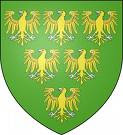I have often wondered if Piers thought his fate was sealed when Warwick captured him. Edward II’s re-action to Piers’ murder was one of shock and anger. I find his re-action particularly telling in that he initially blamed Piers for falling specifically into the clutches of Warwick, as though he was the magnate Piers was most in danger of. Yet Warwick did not immediately carry out the death of Piers. He waited 9 days. Had he acted on his own initiative? Or was there a plot between the barons? In my opinion, Warwick was waiting to hear from the other powerful barons to see if they could all agree on a plan of action. Lancaster, Hereford and Arundel, along wit some of the lesser nobles, made their way to Warwick. Pembroke was frantically trying to assert his right to have Piers back in his custody. He had sworn on his honour to protect Piers, pledging his lands. He appealed to the earl of Gloucester, Piers’ brother-in-law, to intercede. Gloucester could only shrug off Pembroke’s concerns, informing him Warwick had acted with the agreement of the other nobles, and Pembroke’s lands were lost. Pembroke appealed to the University of Oxford, but received no support. If Pembroke had been involved in the plot from the outset, surely he would not have pledged his lands and fought hard to recover the custody of Piers? His honour was at stake.
The barons had Piers in their power – and all that they had previously threatened was within their power. Yet still they seem to have agonised over what to do. It seems likely that Warwick and Lancaster sat in judgment on Piers, whilst two royal justices, William Inge and Henry Spigurnel, were asked to examine the case. The Ordinances had not been repealed in Warwickshire – as Hamilton points out, this was very convenient for the nobles. Thus Piers was sentenced to death. Still the nobles were uneasy and did their best to assure one another of their loyalty. Hereford was guaranteed in writing that he would suffer no personal losses for his role in Piers’ murder. They surely knew what Edward’s re-action would be.
The Vita says that Piers’ was told the news the morning of June 19th that he was to die. Piers’ re-action was a heartfelt lament – ‘Oh! where are the presents that brought me so many intimate friends, and with which I had thought to have sufficient power? Where are my friends, in whom was my trust, the protection of my body, and the whole hope of my safety;…….They had promised to stand by me in war, to suffer imprisonment and not to shun death. Indeed my pride, the arrogance that one single promise of theirs nourished, the king’s favour and the king’s court, have brought me to this sorry plight. I have no help, every remedy is vain, let the will of the earls be done.’
This paints Piers as realising all that he ever had or enjoyed in the past, his rise and fall, was through patronage, and now there was nothing to save him. He realises his pride and arrogance – and how grateful barons must have been to hear him admit it – which suggests to me, he never said it. He surely would not have given ‘the fiddler’ and the ‘black dog of Arden’ the satisfaction. No mention of Piers begging for mercy is mentioned – probably because he knew he would receive none. He must surely have known from his ‘trial’ that he could expect none. One chronicle does mention his vanity – claiming he was too handsome to have his head cut off. This sounds to me more like Piers’ wit, and was said ‘tongue in cheek’.
Piers was led out of Warwick castle and taken along the road to Kenilworth. It seems the ‘Black dog’ was worried – he didn’t want Piers blood shed on his land. Piers was marched out of Warwick’s lands, and as soon as he set foot in Lancaster’s, he was taken to Blacklow Hill. Warwick didn’t even accompany him. Was this a twinge of conscience? Or fear for what he had done? The Vita says Lancaster decided to take control because of his higher birth and he was more powerful. Lancaster handed him over to two Welshmen – ‘one of whom ran him through he body and the other cut off his head’.
Once Piers had been killed, his head and body were abandoned. No-one thought to put his remains on display – an example of the death of a traitor. According to one chronicle, the Annales Londonienses, some shoemakers found the body and placed it on a ladder, and brought it back to Warwick castle. Warwick refused point blank to receive the body, ordering the shoemakers to take it from his lands. This the shoemakers did, and a group of Dominican friars recovered the head and body, which were ‘re-united’ – the head was stitched back to the body. The friars then took the body back to the Dominican house in Langley.
1 week ago



No comments:
Post a Comment